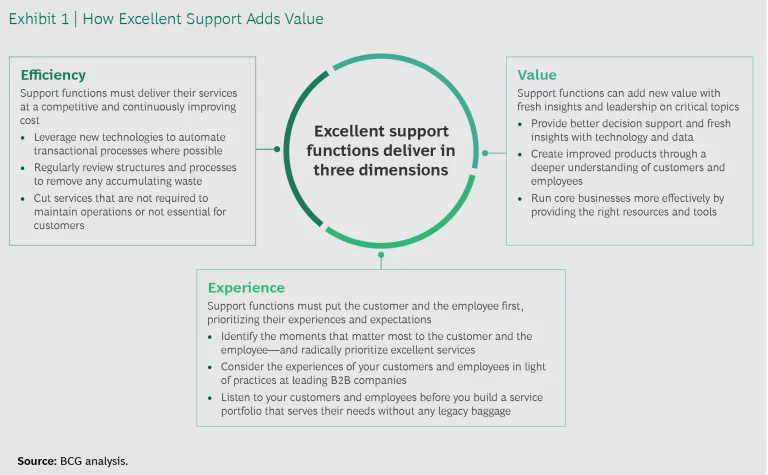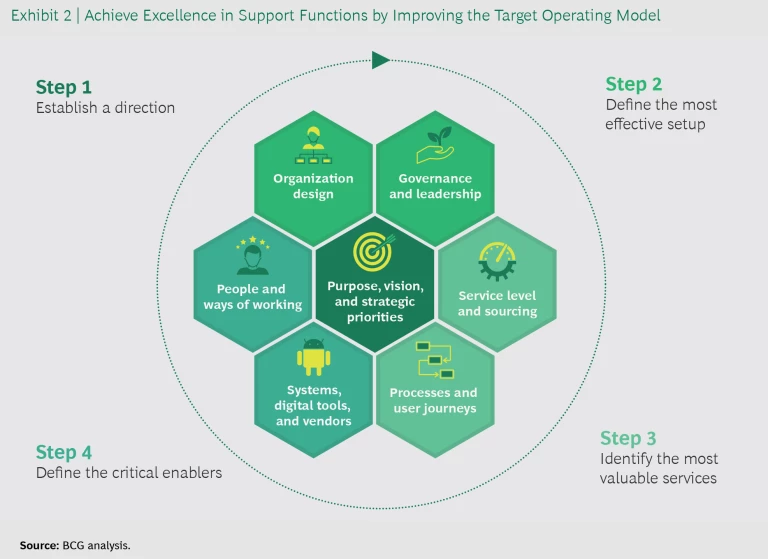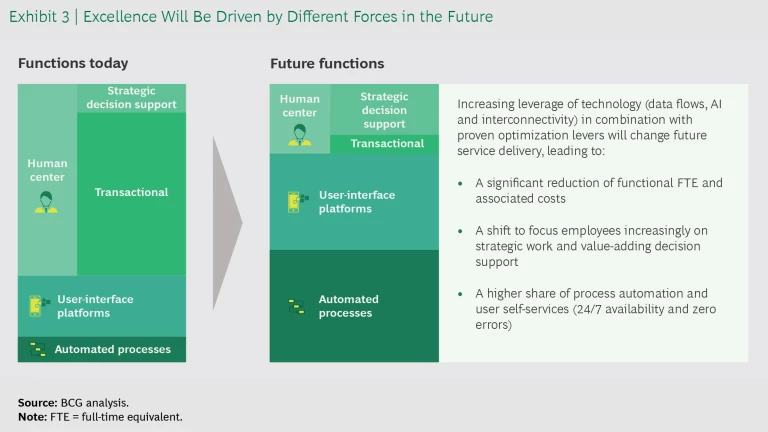Faced with extreme economic uncertainty, growing cost pressures, rapid technological change, and rising customer service expectations, companies are looking hard for a fresh competitive edge—preferably without having to make a huge investment up front.
But with expenses already cut to the bone, investor appetite for new ventures limited, and the times unfavorable for entering new markets or introducing new products, what’s left?
One low-cost strategy that can work even in a challenging market is to enhance the performance of support functions, sometimes referred to as corporate functions. Often dismissed as a cost center, most companies’ support functions now represent a tremendous, multifaceted opportunity. Excellent functional level strategies can yield cost savings and greater customer satisfaction as well as provide a more responsive platform for driving transformation.
Why Focus on Support Functions?
Because business support functions tend to be seen as providers of necessary but generally undifferentiated services with little competitive significance, they are often undervalued. They also tend to be thought of as isolated units—even though, at most companies, support functions represent 10% to 25% of full-time labor costs and a substantial share of selling, general, and administrative expenses.
Advanced support functions can help companies eliminate excess costs and take greater advantage of opportunities.
In fact, support functions can provide value that far outweighs their share of the budget. For example, because advanced support functions can easily scale up or down in line with supply and demand, they can help companies eliminate excess costs and take greater advantage of opportunities. What’s more, an optimized functional level strategy offers management a clearer view of the company and its external business environment and thus can help drive transformative company-wide changes.
What Makes a Support Function Excellent
Excellent business support functions do things differently. (See Exhibit 1.)
Exceptional, value-aware corporate functions provide the data, information, and analysis necessary to make decisions about the right way to pursue a strategic agenda. They also provide the tools needed to execute those decisions. First-rate functions enhance the following three attributes as well.
Efficiency. Excellent business support functions deliver their services at competitive and continuously improving cost because they can scale resources to external conditions and respond quickly to supply disruptions. Achieving an excellent functional level strategy can lead to:
- An improvement in service delivery speed of 200% to 300%
- A decline of 80% in error rates
- An overall need for at least 20% fewer full-time employees
Customer Experience. Advanced business support functions focus intensely on the customer. Drawing on customer feedback and best practices for online user experiences, such units strive to deliver flawless service. Their processes are streamlined to meet the needs of both internal and external customers and to evolve easily as those needs change.
Value. Optimized support functions unite business strategy , people , and technology to promote fast and efficient action. By operating with a deep understanding of customers and employees, such functions generate insights that help executives prune outdated legacy processes and launch new initiatives that add more value.
Regardless of the industry, raising the quality of a business support function to a level of excellence can have a powerful ripple effect throughout the company. (See the sidebar “Powerful Medicine.”) For example:
- A global firm streamlined a loosely organized collection of more than 60 systems and processes—most of them supervised by managers without specialized capabilities—in over 30 countries, creating a new, regionally organized group with fewer systems and more experts. The result: improved service with a reduction in cost of 15%.
- A large accounting firm had a cumbersome forecasting process that required each unit to employ unique data aggregation and forecast-preparation techniques, called for reconciliation at the group level, and necessitated manual forecasts. The firm implemented a new AI-based process that did away with manual data entry and generated group and functional unit forecasts on the fly, yielding hugely improved forecasting abilities.
- A major chemical company redefined its HR unit to better meet the organization’s long-term needs. By rolling out self-service digital HR systems that employees could use throughout their employment and by developing a long-term staffing strategy, the company laid the groundwork for an excellent HR function geared to meet both current and future challenges.
Powerful Medicine
Procure to Pay. After the firm integrated supplier screening based on artificial intelligence (AI), an AI negotiation coach, a new marketplace, and one-click purchase orders, procure-to-pay processing times fell by 70% while the personnel costs to handle payment paperwork fell by 35%.
Order to Cash. The company introduced AI-powered customer credit scoring; real-time pricing management; mobile fulfillment tools that allowed clients to monitor the process and payment date predictions; and automatic matching between orders, invoice, and cash. As a result, the average number of days that receivables remained outstanding fell by 20%. At the same time, workers in the function gained back three to five days per month. Workload and the number of employees both shrank by 40%.
Record to Report. Implementing a collaborative platform for sharing information, automated consolidation, one-touch submission of key financial and management reports, and a data-driven business-forecasting “crystal ball” led to a 40% reduction in the reporting workforce—and higher financial accuracy.
Hire to Retire. The company digitized HR through an AI-based application screening and sourcing platform, AI-supported video interviews, a digital onboarding workflow customized to the candidate, and AI-powered leadership and development initiatives tailored to each individual’s performances and aspirations. These moves led to a 65% reduction of full-time HR employees, 30% greater productivity, and slightly happier candidates (the new method was 4% more popular than the old one).
Connect to Resolve. Adding electronic processes to customer service involved installing a utilization optimizer; live AI support to analyze, route, and respond to queries; more intuitive self-service; driver analytics; and a cloud-based contact center. In the end, all these changes earned the company a customer loyalty score that topped 80%.
As impressive as these results are, they are only the beginning. We find that excellent support functions can bring value to the company that far exceeds the sum of their parts. The reason: excellence is contagious. Once a company has some internally visible world-class functions, other units tend to follow suit.
How to Get There
To upgrade your business support function, begin with a four-step exercise that defines your service ambitions (see Exhibit 2):
- Establish a direction. Outline the vision and strategy as well as the overall design principles and cost ambition for the target state. What is the company’s ambition for the corporate function? How high are you aiming?
- Define the most effective setup. Begin by defining the overall structure, the roles each function will play within it and how its governance works. What would be the best structure and geographic footprint? What would be the most effective governance structure?
- Identify the most valuable services. Align the service levels with the importance of the client, and the functional tasks with the most cost-effective technology for their processing. What services add value? What are the best end-to-end process flows?
- Define the critical enablers. Determine which skills your workforce will need in order to thrive in the coming years. What tools and technology will be needed to support or automate delivery? What professionals will be needed, and what will be the most effective way for them to work? Where do you need to reinvest in capabilities?
The success of this four-step program depends on a number of factors. Start by using a proven diagnostic program to create a strong fact base for understanding the current performance level of your corporate functions. Make sure that top managers are committed to the program. Dedicated teams within each functional unit should develop their own sets of specific blueprints and identify their ultimate service delivery goals. Finally, establish a small, central team equipped with the right tools to ensure progress and compliance with defined design principles.
Much of the development work will entail integrating more digital technology into the system. Technology will take on an increasing share of the workload in most functions. In HR, for instance, we believe technology will soon handle more than half the work, freeing employees for more strategic tasks while cutting error rates and expenses. (See Exhibit 3.)
The cost? Ultimately, this effort should be not only self-funding but also profitable, as unnecessary processes are eliminated and error-prone manual processes are replaced by more accurate and cost-effective digital systems.
Better and Best
In a tough economy, organizational choices often seem to fall between bad and worse: the tradeoffs either buy time but compromise your long-term position or raise your short-term risks but position your firm well for the recovery. Transforming your support functions, however, is an exception. Excellent support functions not only help your firm operate more efficiently now, but they also can give you more control over your company’s processes, more insight into its operations, and more data-supported guidance for your next strategic move.















